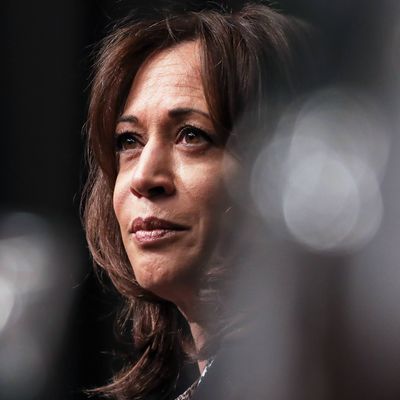
Put aside ideology for a moment, and you can quickly see why California Senator Kamala Harris is a demographic dream candidate for president. Her father is Jamaican, her mother is Indian, her husband is Jewish, and she’s relatively young (54) and even more youthful looking, in a field dominated by septuagenarians, with a pleasant though entirely professional manner. The adjective you always hear about her is “disciplined,” which is a quality Democrats definitely want in gambling on anyone to take on Donald Trump and the savage hate-fest he is certain to unleash on his opponent.
But in competing for progressive support (which she needs to do as a prospective “unity candidate” in the left-leaning field of a left-leaning party), Harris has a problem: Her entire 13-year career in public office before her election to the Senate in 2016 was as a prosecutor, first as district attorney of San Francisco and then as attorney general of California. For some progressives, that alone is an issue, as encapsulated in the frequently heard taunt: “Kamala Harris Is a Cop.” For others, the concern is simply that Harris rarely if ever was front and center on major controversies relevant to her profession, from criminal-justice reform to prosecution of big-time corporate criminals. Indeed, some of her signature initiatives (like the fight against school truancy in San Francisco, in which she proposed criminal sanctions on parents for kids who missed classes) arguably aimed at insulating her from any attacks on her right flank.
This is a particular worry for her campaign manager — who also happens to be her sister — Maya Harris, a respected civil rights attorney who was an officer in the ACLU and helped edit Michelle Alexander’s landmark book on mass incarceration, The New Jim Crow. While she can certainly vouch for her sister’s soundness on such issues, she cannot always explain away the moderation — or some would say, lack of courage — that has marked the candidate’s public career, at least up until the time she ran for the Senate.
It appears the family/campaign narrative to explain the Harris sisters’ different paths (which have now converged) is that one chose the inside and the other the outside, as Jamileh King reports:
“Maya has always been more of an advocate, while Kamala has chosen to work within some of the most systemically racist institutions in the country,” says Lateefah Simon, a longtime family friend who also ran a program that aimed to keep people charged with first-time nonviolent offenses out of jail in Kamala’s district attorney’s office. The decision to go into law enforcement was one that Kamala described on many occasions as having to “defend…like one would a thesis” to her family. “There’s an important role to play on the outside, banging down the door, on bended knee, trying to change the system,” she recounted in an interview in 2018 on the popular hip-hop morning show the Breakfast Club. “But we also have to be inside the room where the decisions are being made.”
A more subtle but parallel argument for Kamala Harris’s moderation is made in a long profile of the candidate by Elizabeth Weil:
Harris’s demographic identity has always been radical. She was San Francisco’s first female district attorney, first black district attorney, first Asian American district attorney. She was then California’s first female attorney general, first black attorney general, first Asian American attorney general. She was the second black woman, ever, to win a seat in the United States Senate. But in office, she’s avoided saying or doing much that could be held against her. As attorney general, she declined to support two ballot measures to end the death penalty. She declined to support making drug possession a misdemeanor. She declined to support legalizing pot. She declined to support a ballot measure reforming California’s brutal three-strikes law. The point is: She had power. She kept most of it in reserve. More important than fixing the broken criminal-justice system, it seemed, was protecting her status as a rising star.
It’s what Weil describes as Harris’s “long game,” which “infuriated constituents over the years who wanted Harris to take a stand and fight for them today, not when she reached a higher office.” That’s part of a narrative in which all the audacity she stored up over the years to protect her career is now flowering fully in her progressive plans for the presidency.
This, of course, makes Harris very different from, say, Bernie Sanders, who for the most part is promoting the same agenda now as he did when he entered Congress in 1990. Elizabeth Warren is another rival who has been very consistent in a shorter political career. So even those who believe electing a multiracial woman as president would be a huge breakthrough moment for the country may struggle to prefer her to candidates who have been, to quote George McGovern’s 1972 campaign slogan, “right from the start.”
Harris has in her favor a path to the Democratic nomination that is entirely plausible (it’s basically Barack Obama’s in 2008, with the added factor of an early primary in her huge home state of California), combined with the vulnerabilities of so many others in the enormous field. If she can gain some momentum, she could indeed become a unity candidate, with her timid, moderate law-enforcement record perhaps even helping her party in a close general election. But first she needs to build some trust with doubting progressives, and that may mean sounding as tough on herself as she used to sound about the objects of her prosecutorial ill intentions.






























